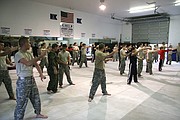Readying them for battle
POST FALLS - Muscle-bound and broad-shouldered, Col. Michael Foley knows how to win a fight.
A career soldier with 30 years of special operations experience, he's well-versed in hand-to-hand combat, martial arts, weaponry and tactics. No stranger to battlefield conditions, he has served in numerous war-torn countries and can speak multiple languages.
In short, he's the kind of guy you want on your team.
"Go through it as many times as you have to, to know it," Foley said Sunday, speaking to a class of eager Idaho National Guard trainees at the Hand-to-Hand Combat Training Center in Post Falls. "Crawl, walk, run."
The students were practicing various combat moves, some offensive, some defensive. It was Day 2, hour 10, and the group was making progress.
"As you can see, a lot of them are kind of young," Foley said. "Some of 'em are just out of high school. But they're really putting out the effort. Because they're in uniform now, and being soldiers, they're trying to act like soldiers - which is awesome."
For the third straight year, Foley instructed the National Guard students free of charge. Thirty-two guardsmen and women gathered at the training center on Seltice Way, a multi-purpose gym with a large workout area and weight room.
"Col. Foley has donated his time and facility. He likes to train soldiers for wherever they go next, to be able to defend themselves," said drill sergeant Terry Morgan. "It's a lot more individual technique than what they'll learn in basic training. They're not your typical 17-, 18-, 19-year-olds. They've made a commitment.
This isn't just a P.E. class. This is potentially going to save their life, or the life of a battle buddy, down the road."
Many of the trainees were part of the Idaho National Guard Recruitment Sustainment Program. Some were students at the University of Idaho, and involved with the college's ROTC. A few were still in high school.
For most of them, Foley's class was their first hand-to-hand combat experience.
"Lots of learning," said Daniel Wagner, a 21-year-old private from Coeur d'Alene. "I think it's great. We get certified (in combat training) before we even get to basic, so we're ahead of the game. (Foley) is stern but fair."
The students were on a tight schedule. Class began Saturday afternoon, ran well into the evening, and then started up again early Sunday morning. Foley taught the rudiments of unarmed combat - basic positioning, footwork, holds and take-downs. Students learned how to counter a sudden attack, and how to subdue a dangerous adversary.
Foley made sure the class stayed on point, but he also created an enjoyable learning environment.
"He's really nice," said Pvt. Victoria Cass of Newport, Wash. "And he won't tell you you're doing it right, if you're not doing it right."
A few trainees, like Cdt. Hattie Emmett and Pvt. Zach Livingston, had already attended basic training. Foley's instruction differed, they said; he taught a stand-up style of combat, as opposed to the grappling, wrestling style they had learned in basic.
"It's absolutely fantastic," said the 19-year-old Livingston, of Spirit Lake. "It's fun, and still challenging. It gives me a confidence that better prepares me for the unknown."
Emmett, 19, said she enjoyed the class as well. Combat was not something she had mastered during basic training.
"It's interesting to learn, and somewhat handy to know in life, I think," Emmett said. "(Foley) is a good instructor. He has a lot of patience, and takes us step-to-step, slowly and concisely. I feel confident I could protect myself, or my men if I have to."
Altogether, the National Guard students received about 13 hours of free, in-depth instruction. Foley laid the groundwork for future combat training, giving his students a valuable head start.
"He's very good at reinforcing that basic level - doing the basics right," Morgan said. "So there is a good foundation. (The trainees) are having a good time, which is another real benefit to the kids. The colonel, with as much knowledge as he has, he can change things up and keep it fun."



